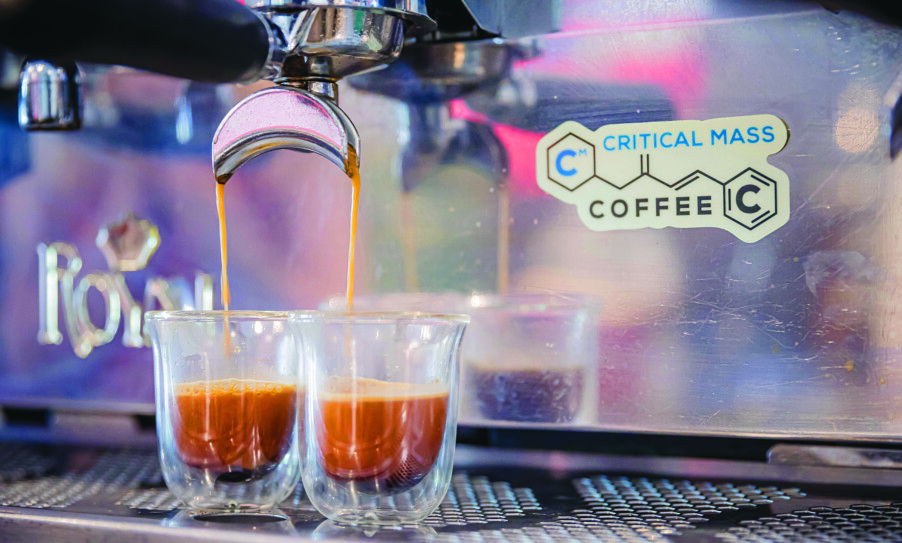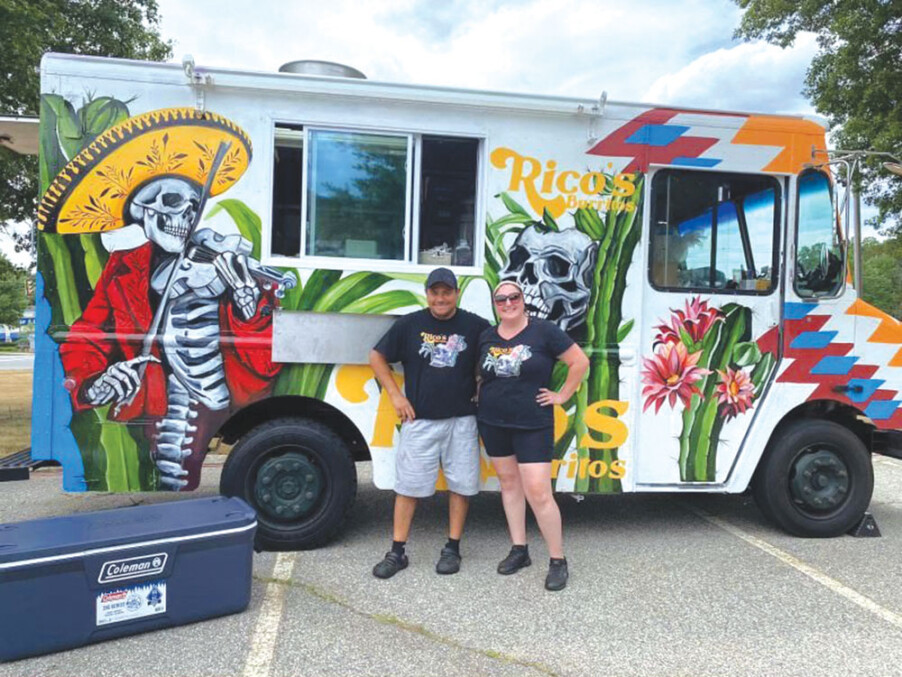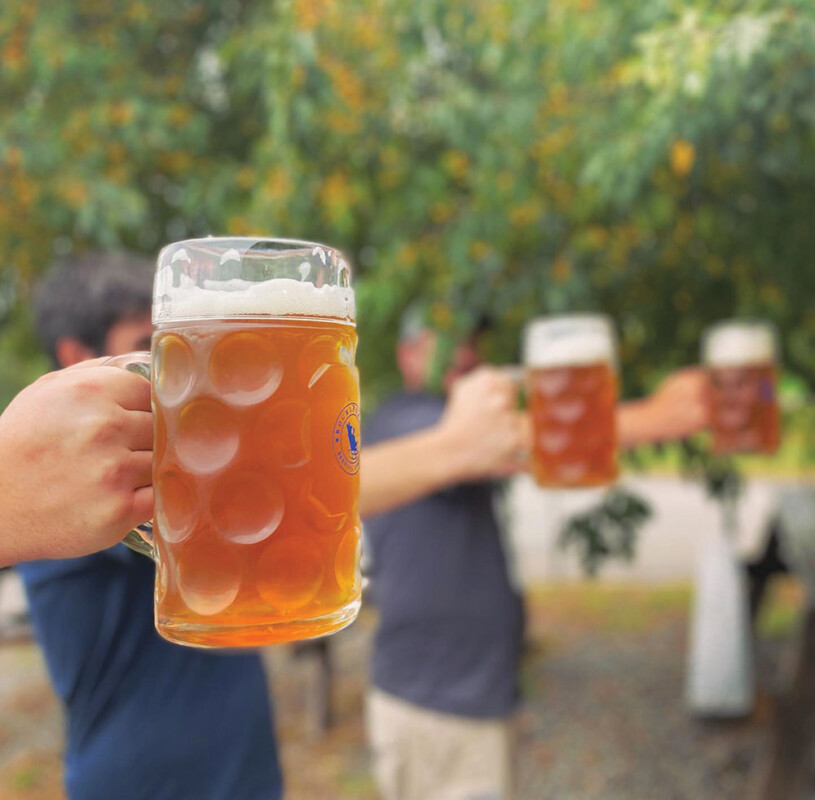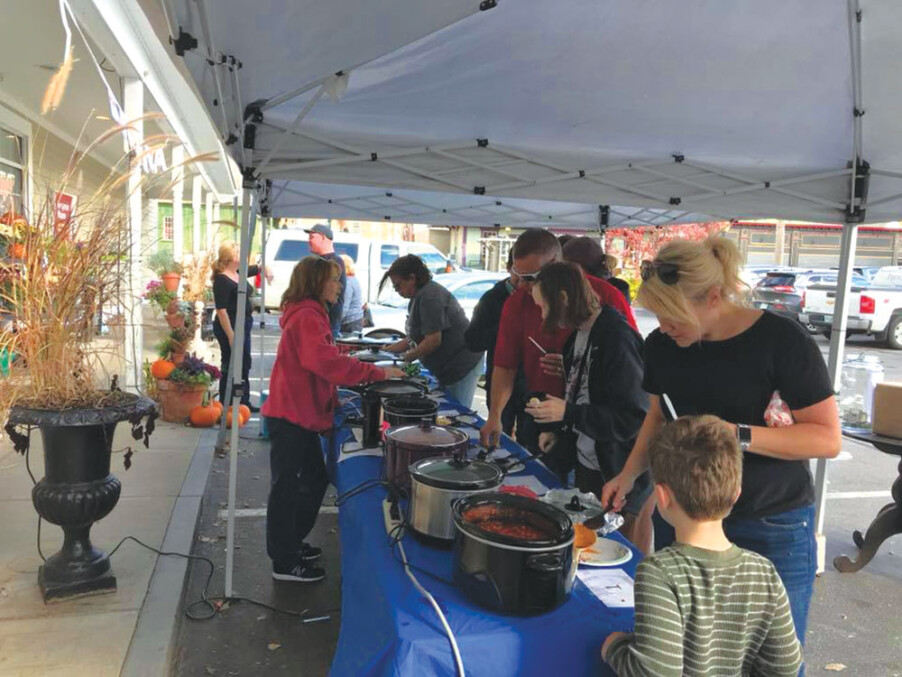NH coffee roasters discuss how they craft the perfect cup of joe
To understand and appreciate specialty coffee is to experience it. I didn’t know what a coffee cupping was prior to writing what you’re about to read, but when Kevin Clay of Mill City Roasting Co. invited me to partake in just that, I nonetheless felt compelled to accept his offer.
As I’d come to find out, a coffee cupping is kind of like a wine tasting — but for coffee beans. And as far as I’m concerned, there’s nothing better than that crisp smell of freshly ground coffee beans ready to be brewed in my morning’s cup of joe. I knew that I’d be in for a treat.
I arrived at Mill City’s Londonderry facility just in time to witness Clay pour three seemingly identical — but, in actuality, very different — freshly roasted coffees into a series of three small cups on a table. Two additional cups, one empty and one filled with water, accompanied them.
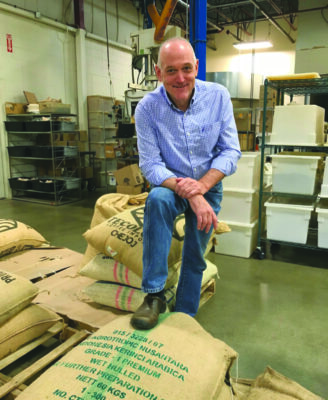
“They’re all going to smell and taste like coffee,” Clay told me, “but there’s definitely going to be subtle little differences in the taste and the flavor.” I must admit that this was where a trepidation on my part began to creep in — what if they all just smell and taste like the same cup of coffee and my senses overlook the intention of this exercise? I was pleasantly proven wrong.
Following Clay’s lead, I picked up a spoon and gently removed the residual film on the top of each cup, rinsing it in the cup of water in between. I then placed my nose right up against each coffee to test its aroma, starting with a Brazilian roast before following suit with a Colombian roast and an Ethiopian roast. After that, it was time to do some tasting.
“Basically, you want to aerate it as you bring it over your palate, [which] tastes things differently in different parts of your mouth,” Clay said. “You should get different characteristics.”
Tasting each of the three coffees one by one — slurping them from my spoon like a sommelier might slurp wine — I was surprised to find that, yes, I actually did pick up some variations, albeit very subtle. The Colombian coffee, for instance, tasted slightly sweeter and cleaner than the Brazilian coffee, while the Ethiopian coffee gave off a sensation that a dry wine might give your palate, a kind of full-bodied mouthfeel.
As Clay would tell me, this process of cupping is a popular industry technique among coffee roasters. It helps him and others make decisions about which coffees to purchase in larger quantities to prepare for roasting. It’s also an effective method for them to check on their own consistency by way of sample-sized roasts.
“Coffee, no different than wine, country to country and even within region to region of a given country, is going to have differences in the characteristics because of the micro-climates,” he said. “Everything that we do is focused on having the best cup of coffee that we can.”
Our coffee cupping exercise complete, I sat down with Clay to get his insight on the growing specialty coffee scene in New Hampshire. What follows are even more stories of how local coffee roasters and cafe and coffee bar owners have joined the specialty coffee movement, as well as where you can go to get that freshly roasted cup of joe.
A changing landscape
When Clay founded Mill City Roasting Co. in 1996, things were a bit different.
“The industry has really changed,” he said. “When we first started, our major competitors were New England Coffee out of Malden, Massachusetts, and then Green Mountain Coffee was the biggest one on the block. They’re still here and do a lot of business in our market, but mostly in convenience stores. … A lot of that specialty business is really gone.”
Starbucks, meanwhile, had yet to really make a stamp on the East Coast, only just opening its first store in Washington, D.C., a few years prior.
“Starbucks was primarily on the West Coast at the time, and they were really a phenomenon,” Clay said. “We used to travel out west to find out just what those guys were doing that was so different, because there really weren’t cafes here. There was a Gloria Jean’s around that used to sell bulk coffees and they had an espresso machine, but they really weren’t there to sell coffee drinks. They were selling sweet stuff.”
Clay estimates that you probably could have counted the number of coffee roasters in New Hampshire on one hand — such as around three, maybe four — back in the mid-’90s.
“When I first started in ’96, I thought to myself, Manchester is going to have espresso cafes on every corner in the next five years and we’re going to be right in the middle of it,” he said. “That didn’t happen.”
But what has happened — albeit, somewhat slowly and gradually — is a growing trend in specialty coffee roasters at home. Their stories for jumping into the coffee roasting world may vary, but they all had one thing in common: a desire to ditch the mass-produced stuff in favor of a really fresh, high-quality cup of coffee.
“When my husband and I ended up moving to New Hampshire, there just really weren’t coffee shops around, and if they were, it was Green Mountain Coffee or Dunkin’,” said Emeran Langmaid, founder of A&E Coffee & Tea, which operates a roastery in Nashua and a cafe in downtown Manchester. “Having that intentional coffee … was something that was very missing on the landscape. It was missing the point of development of the connection between the grower, the producer, and its quality. … And also, the sustainable elements of coffee and having a social impact, because coffee can do that.”
In Milford, Union Coffee Co. is another great example of how that connection can be made. Current Union owner and head roaster David Cianci had been working in the Peace Corps in Paraguay, eventually going from there to Colombia, where he was introduced to the work of coffee farmers.
“That’s where I got into coffee. … [I was] working on a coffee farm and understanding the coffee harvest, and just the processing and what it takes to get it from the plant to a product that’s ready for export,” Cianci said. “We were purchasing whole-bean coffee [at Union] … but then, you get to a point running a cafe when you’re just using so much whole-bean roasted coffee and you’re paying a lot for it, that it makes sense to start to finance your own roasting equipment. You do that and then it becomes a whole other revenue stream of selling your coffee.”
And on that note, Cianci said there are all different styles of available roasters.
“There are fluid bed roasters, which are pretty much like big warm pans that coffee sits in, and there are air roasters, where … you’re basically using hot air to roast the coffee,” he said. “The super-traditional one is what we have, which is a drum roaster. It’s either stainless steel or cast iron, and there are heating elements below it, and the drum spins around and the coffee cooks. After that, you reach a certain point where it will split open and you drop it out of the drum.”
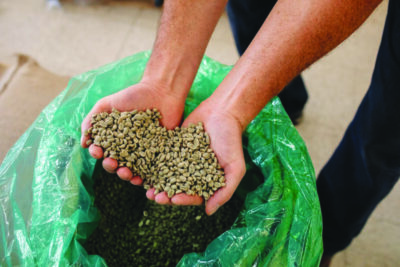
A&E operates two Diedrich brand drum-style roasters, Langmaid said — the smaller of the two, a black roaster nicknamed “Black Betty,” is reserved for smaller and more complex coffee batches, while a much larger golden-colored roaster nicknamed “Big Honey” is used for larger batches. The differences, Langmaid said, have to do with each roaster’s air flow.
For some local roasters the coffee journey has been a little more unconventional. Mike Brown of Hometown Coffee Roasters in Manchester recalls first dabbling in coffee roasting with a popcorn popper he bought at a secondhand store.
“At the time, I was drinking Dunkin’ or just coffee you get at the grocery store, and I never thought it was all that great, so I just kind of started researching coffee in general and I came across an article on how you can roast coffee at home,” Brown said. “So I started roasting out of a little popcorn popper in my garage and then it turned out to be a great cup of coffee, even compared to the stuff you find on the shelf at a large grocery chain.”
Fast forward just a few short years and Brown now operates his own coffee bar on Old Granite Street in Manchester, also wholesaling to dozens of accounts including some local Hannaford Supermarkets. And in case you’re wondering, yes, he has graduated from the popcorn popper to a Diedrich brand roaster, capable of producing two dozen-pound batches at a time.
A deeper mission
Coffee is the seed of a fruit that, not unlike the apple, comes in all kinds of varieties.
“With apples, obviously sometimes they are green, sometimes red, sometimes they are sour, or some are better for baking. They have all of these different characteristics. Coffee is exactly the same way,” Langmaid said. “We’ve always had coffee come basically from all of the main growing regions around the world, so [that includes] Central and South America, Africa, and then the Asia-Pacific.”
According to Cianci, where coffee is grown, what altitude it’s grown at and what kind of harvest season a farmer has experienced are all important factors to consider when purchasing coffee.
“After coffee is picked, there are different ways to separate the coffee cherry from the bean that’s inside of it,” he said. “With natural processed coffee, it’s like a raisin, where it’s picked and put directly into a drying bed to dry in the sun. … That’s going to be where you get a lot of potential for those really funky interesting fruity flavors. Because the bean is in contact with the cherry, it has higher carbohydrates and sweetness content in general.”
Coffee roasters typically get their hands on the beans — known as green beans, not the vegetable but the industry term referring to unroasted beans — in one of two ways. Most producers, Langmaid said, are part of member-owned cooperatives and will sometimes sell their beans under their own name.
“The pros of doing that is if it’s a good quality, you can establish a name for yourself, and then you can negotiate higher prices with the buyer,” she said. “The drawback is if you don’t have those connections, or people just don’t pick your coffee, then it can just sit there. … The alternative is to sell coffee that’s just all blended together from all the producers, and that is sold on the co-op level so it’s sold by the co-op name.”
Langmaid said that A&E will purchase its beans both of these ways, via blends or what’s called single-origin, meaning there’s only one coffee from one place in your cup.
As for Union, Cianci said that about 70 percent of all their coffee is acquired through direct purchase agreements with farms in countries like Colombia and Guatemala.
“The fewer intermediaries there are, the more money is going to the farmer, the actual producer of the coffee,” he said. “That’s the bottom line.”
It’s understanding the importance of those relationships and maintaining a sense of transparency, Clay said, that makes purchasing single-origin green coffee beans so paramount.
“I’ve stood at a co-op … and I’ve watched a guy bring two or three bags of coffee beans on a donkey in Colombia. They take a sample of the bag and they put it out on the table and grade it, and he, that farmer, gets paid on the consistency and quality,” Clay said. “What I love about Colombia … is that the Colombian Coffee Federation is actually owned by the farmers. … So I look at that and I think, OK, they really have an opportunity to impact their lives and their income. People would not comprehend just how much work goes into it.”
From bean to cup
You’ve probably heard the terms “light roast,” “medium roast” and “dark roast” when it comes to coffee, but what do those mean when it comes to the drink’s production process? Emeran Langmaid of A&E Coffee & Tea said it all has to do with a roast’s time and temperature.
“A lighter coffee is just in the roaster for a shorter time period, and potentially at a little lower temperature,” she said. “Then, the longer you leave the coffee in the roaster, the higher the temperature you go. … Generally speaking, a lighter coffee is going to be a greater perceived acidity, so the more you develop that in terms of roasting, the more you diminish the acidity and develop sweetness as well. You’re caramelizing your sugars from fruity components into more lactic, chocolate or caramel components.”
David Cianci of Union Coffee Co. in Milford said there are two major events in a roast cycle: “first crack” and “second crack.”
“‘First crack’ is when the beans will reach a point where they’ll split open and a burst of water vapor comes out. You’ll hear them cracking, almost popping like popcorn,” he said. “After that, if you leave the coffee in long enough and you roast it dark enough, it will go through ‘second crack,’ where it will almost puff out a little more, even more like popcorn. … We actually use roasting software to track all the data from each roast, and when we hear the beans crack, we’ll mark that in the data.”
Get roasted
Just about everybody I spoke with for this story agreed that specialty coffee is on the rise in the Granite State, even just within the last few years. And that doesn’t only apply to the roasters themselves, either — it’s also on the consumer side.
“When I originally started roasting coffee about six years ago, I always wondered if specialty coffee was popular in New Hampshire … but I’ve come to find out that there’s a real desire for it and there’s a desire for consumers to want to learn about it,” Brown said. “I’m right there in the shop every day roasting coffee and I have at least two or three people a day coming over and asking me questions about it. And even to my surprise, a lot of people know a lot about it, but then there’s also a lot of people who just think of it as a cup of caffeine to wake them up in the morning. But then once you educate them on the journey that it takes from seed to cup, they are mesmerized by it.”
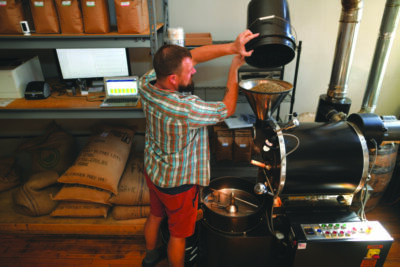
I was admittedly one of those people once upon a time. You can go into the coffee aisle of any major grocery store chain and see the roast date printed on any bag of whole bean or ground coffee. Sometimes that date is many weeks or even a month or more before the day you’re there.
“The stuff we do on our website is usually shipped the day it was roasted,” Clay said. “So, freshness in coffee is huge, and you’re just not going to get that at Dunkin’ or at Starbucks.”
Langmaid said that, while the espresso coffee shop culture remains most popular among younger generations, she believes the effects of the pandemic have altered that.
“Obviously a lot of people had to start drinking coffee at home and experiencing it in a different way,” she said. “There’s a trend, I think, across the board of being a home barista. And that isn’t necessarily getting an espresso machine, but maybe it’s just taking a few minutes to make your coffee at home, and investing in a good grinder. It’s kind of a swing in terms of how people are purchasing coffee and how they are experiencing it.”
New England Coffee Festival
A two-day event celebrating specialty coffee culture, the New England Coffee Festival debuted in downtown Laconia earlier this year. It’s presented by Wayfarer Coffee Roasters and packed with local speakers, workshops, vendors, samples and even a competitive “latte art throwdown.”
“Our goal … was to have a community event that brings coffee professionals and coffee consumers together, and really to build relationships and get people to try locally made products,” Wayfarer Coffee Roasters co-owner and festival organizer Karen Bassett told the Hippo in May. “We want to kind of give awareness to what specialty coffee is, and how there actually really is a lot of really good high-quality coffee right here in New England.”
According to Bassett, the inaugural event was a huge success, drawing around 5,000 attendees to the area and featuring more than 50 local vendors. Plans are already underway for the festival to return for a second year in 2023, to be held on Friday, May 19, and Saturday, May 20. That event will feature even more hands-on workshops and outdoor vendors, as well as a latte art throwdown in front of a grand audience on the Main Stage of Laconia’s Colonial Theatre.
Local specialty coffee roasters
Here’s a list of local cafes, coffee shops and small-batch roasters offering specialty house roasted coffees. Do you know of a coffee roaster based in the Manchester, Concord or Nashua area that’s not on this list? Let us know at food@hippopress.com.
A&E Coffee & Tea
1000 Elm St., Manchester; 95 Northeastern Blvd., Nashua, 578-3338; aeroastery.com
Established in 2001 by Emeran Langmaid, A&E was the first USDA-certified organic coffee roaster to come to New Hampshire. The company sources all types of single-origin coffees from around the world with an emphasis on sustainability. In addition to a cafe in downtown Manchester, A&E operates a roastery in Nashua where bagged beans and teas are sold.
Blue Harbor Coffee Co.
446 Lafayette Road, Hampton, 601-8802, blueharborcoffee.com
Coskun Yazgan’s family has been roasting their own coffee beans for more than three decades at Caffe Kilim in Portsmouth. Arriving in downtown Hampton in late 2019, Blue Harbor Coffee Co. became Yazgan’s own space to create his own unique coffee blends and baked goods. The small-batch roaster of artisan coffees sources its beans from all over the Coffee Belt, including Central America, Africa and even Papua New Guinea.
Bonhoeffer’s Cafe & Espresso
8 Franklin St., Nashua, 883-6879, bonhoefferscafe.com
Just steps away from Main Street in downtown Nashua, Bonhoeffer’s serves its own house-roasted direct trade coffee, plus a food menu of crepes, breakfast sandwiches and burritos, paninis, wraps and salads. Profits from the sale of Bonhoeffer’s roasted coffee go to the cafe’s sister nonprofit organization, Hope and Life for Kids.
Breaking New Grounds
50 Main St., Durham, 868-6869, bngcoffee.com
Founded in 1993 in Portsmouth, Breaking New Grounds has been a go-to spot in Durham for its in-house roasted coffees since 1997. Beans are often roasted three to four times a week and have origins in multiple major growing regions in Central and South America as well as Africa.
Caffe Kilim and Market
163 Islington St., Portsmouth, 436-7330, caffekilim.com
In addition to brewed coffees and a full espresso bar of drinks using its own roasted beans, Caffe Kilim is known for its Turkish market, featuring a variety of specialty and natural foods.
Cindia Jackson’s Fine Gourmet Coffee
650 Amherst St., Nashua, 345-5566, cindiajackson.com
With more than 2,000 coffee varieties, Cindia Jackson’s is known for featuring one of the largest coffee lines around. According to owner Jim Flowers, the business is named as a tribute to his mother, who became interested in coffee way back in 1949, at the age of 12 — working as a waitress with her mother, who was a cook, Jackson took it upon herself to add vanilla, maple syrup, honey and other sweet ingredients to brewed coffees. It’s with that creative spirit that Flowers and his wife have carried on her legacy. Coffees are roasted just a block up the road from the Cindia Jackson’s retail shop on Amherst Street in Nashua, with just about every flavor imaginable. There’s even a “Booze Brew” line of more than 30 alcohol-flavored coffees (which, of course, are non-alcoholic).
Clarena’s Coffee
Laconia, clarenascoffee.com
Based in New Hampshire Lakes Region, Clarena’s Coffee is known for sourcing its beans entirely from women-owned farms in Colombia and Brazil. Locally, you can find custom blends and roasts at Dancing Lion Chocolate (917 Elm St., Manchester).
Coffee Coffee
326 S. Broadway, Salem, 912-5381, coffeecoffeenh.com
Coffee Coffee owner Barry Goldman has been roasting coffee beans from all over the world since 1966. Located on South Broadway in Salem near the Methuen, Mass., state line, the shop has a special organic coffee roaster Goldman uses to roast thousands of beans from around the world every day. Coffee Coffee even makes its own coffee ice cubes, blended with several different types of roasted coffees.
The Coffee Factory
55 Crystal Ave., Derry, 432-6006, mycoffeefactory.net
Established by the Yorke family in 2008 in their hometown of Derry, The Coffee Factory roasts its own beans on site to produce a full line of hot and iced coffees and espresso drinks. The spot also offers breakfast and lunch sandwiches, and regularly maintains a schedule of open mic events.
Critical Mass Coffee
Manchester, criticalmasscoffee.com
Ryan Connor was a 22-year veteran of the engineering industry before he and his wife, Leah, got into coffee roasting, originally as a hobby. Founded in 2018, Critical Mass Coffee is an organic coffee roastery based in Manchester that sources its beans from all over the world’s major growing regions. In addition to operating an e-commerce website, Critical Mass Coffee sells to some area restaurants, cafes and independent retailers. They’re also a featured vendor at the Made in New England Expo, due to return to the DoubleTree by Hilton Manchester Downtown on Saturday, Dec. 3, and Sunday, Dec. 4.
Farmhouse Roasters
163 Main St., Salem, 458-7172, farmhouseroasters.com
Roasting its own beans from a variety of growing regions, Farmhouse Roasters always offers fair trade, organic and other certified coffee options. Its cafe features a full line of hot and iced drinks in addition to breakfast and lunch sandwiches, baked goods and more.
Flight Coffee Co.
209 Route 101, Bedford, 836-6228, flightcoffeeco.com
Claudia Barrett’s experience in specialty coffee stretches back more than 30 years. Flight Coffee Co. got its start more than a decade ago with one small commercial coffee roaster in the garage of Barrett’s Bedford home. Since then, her company has expanded — now offering everything from specialty coffees and espresso drinks to bagels and pastries — and has experienced recognition at the national level, winning multiple coffee competition awards and being featured in the coffee industry trade magazine Roast several times. In 2013 Barrett became the first Certified Q Grader in New Hampshire, a professional coffee cupper accredited by the Coffee Quality Institute. She would soon launch a coffee roastery on Harvey Road in Bedford, eventually turning an adjacent space into what she called a “satellite cafe.” Last year she moved all operations to a new flagship space across town, taking up a portion of the former Harvest Market store on the corner of Wallace Road and Route 101.
Granite Ledge Coffee
Canterbury, graniteledgecoffee.com
Christopher Evans got his start in the coffee world when his beans were roasted in iron skillets, brought to temperature in an electric oven. Over the last few decades, Granite Ledge Coffee has grown to now offer all kinds of specialty roasted coffees sourced from farmers across the world. Coffee by the pound is available for sale at the Concord Farmers Market, which wraps up its outdoor season on Saturday, Oct. 29, from 8:30 a.m. to noon on Capitol Street.
Hometown Coffee Roasters
80 Old Granite St., Manchester, 703-2321, hometownroasters.com
Mike Brown started Hometown Coffee Roasters as a hobby in the garage of his Bedford home, eventually expanding it into a commercial roastery. In October 2018 he moved the business into his current space in Manchester, where he also launched a coffee bar by the summer of 2020. Brown sources his coffee beans from all of the major growing regions, including Central and South America and Africa.
Horseshoe Cafe (Kozuma Coffee Co.)
171 Main St., Newmarket, 292-5280, find them on Facebook @horseshoecafenewmarket
Norihiro Kozuma, who’s originally from Japan, and his wife Sarah of the Kozuma Coffee Co. opened the Horseshoe Cafe back in 2017, after Norihiro became interested in home coffee roasting. The cafe features a variety of hand-selected artisan coffees roasted in house, along with a menu of small-batch baked goods and pastries, and sandwiches on scratch-made breads.
Java Joe’s
59 Route 27, Raymond, find them on Facebook @javajoesraymondnh
Paul Lynn of Raymond launched this drive-thru shop, which offers specialty coffees, teas and various breakfast items, in 2015. Lynn built the 300-square-foot drive-thru himself and roasts his own coffee beans in house, which include Colombian, Sumatran and several other varietals. Java Joe’s also features a full line of espresso drinks, including macchiatos and chai lattes, and egg and cheese sandwiches available on English muffins, bagels or croissants.
King David Coffee Roasters
48 Bridge St., Nashua, 577-8899, kingdavidcoffee.com
Using a traditional drum roaster, Sam Brest of King David Coffee Roasters can produce up to 30 pounds of roasted coffee at a time. Brest got his start in the coffee roasting industry back in the early 2000s, owning his own sandwich shop in Nashua for about 14 years before. His beans are only single-origin, coming all over the major growing regions of Central and South America, Africa and Indonesia. Brest also operates a commercial kitchen, producing and selling his own kettle corn.
La Mulita Coffee
15 Sagamore Road, Rye, 858-1019, lamulitacoffee.com
This Rye coffee bar and roastery is unique for highlighting multiple growing regions in Colombia — it’s the brainchild of Max Pruna, who himself was born and raised in the Colombian city of Medellín. Pruna’s coffee roasting journey began in his own home garage before he opened La Mulita in September 2019. In addition to serving specialty Colombian coffees and espresso drinks, La Mulita partners with several local businesses to offer food items like bagels, doughnuts and scones.
Lucas Roasting Co.
7 King St., Wolfeboro, 605-5484, lucasroasting.com
Offering both single-origin coffees and gourmet blends, Lucas Roasting Co. is a small-batch roastery in Wolfeboro that also features a small walk-in cafe space where you’ll find a hot and cold beverages as well as assorted food items.
Miles to Go Coffee Roasters
Chester, 887-4343, milestogocoffee.com
Ed Karjala of Chester turned his hobby of home coffee roasting into a business in late 2018. Miles to Go Coffee Roasters, run by Karjala with the help of his wife, Christi, will usually have six or seven different coffee products available — some are single-origin, while others are blends of two or more origins. Bags of Karjala’s coffees are available for sale at the Chester General Store (2 Haverhill Road) and via his website.
Mill City Roasting Co.
Londonderry, millcityroasting.com
Kevin Clay has decades of experience in the specialty coffee industry, having founded Mill City Roasting Co. in 1996. Sourcing its beans from several major growing regions across Central America, South America and Africa, Mill City Roasting Co. operates a production facility in Londonderry, roasting and selling its coffees under the brand names Cafe Du Jour and Java Tree Gourmet Coffees. Coffees are sold in several restaurants and stores across southern New Hampshire and, as of 2020, now available for sale direct-to-consumer through an e-commerce website.
Natalie’s Coffee
Derry, nataliescoffee.com
Based in Derry, the family-run Natalie’s Coffee has been roasting fresh gourmet coffee on demand since 2001, according to its website. You can also find their coffee used exclusively at Janie’s Uncommon Cafe (123 Nashua Road, Londonderry).
New Hampshire Coffee Roasting Co.
7 Sumner Drive, Dover, 740-4200, nhcoffee.com
This small-batch coffee roaster sources its beans from all of the major growing regions around the world. At the start of 2020, the Barretto family of Dover took over all of the company’s operations. You can find New Hampshire Coffee Roasting Co. in several area restaurants and specialty stores, as well as for sale online or at its Dover factory outlet.
Porcupine Coffee Roasting
Pembroke, porcupinecoffeeroasting.com
Amber White had been roasting her own coffee beans on and off for a few years as a hobby prior to transitioning into a commercial business. Porcupine Coffee Roasting, she said, started during the Covid lockdowns of 2020 — White is now mainly based online, although she is a featured vendor at a few local farmers markets in the summer, and you can also find her coffees at Sweet River Farm (175 North Road, Deerfield). Currently in her roastery, White has beans sourced from countries like Mexico, Colombia, Sumatra, Peru and Ethiopia.
Port City Coffee Roasters
801 Islington St., Portsmouth, 433-3011, portcitycoffee.com
Established in 1992, Port City Coffee Roasters sources its own beans from multiple growing regions around the world with an emphasis on sustainability. In addition to offering coffees at its own cafe, Port City Coffee Roasters partners with area restaurants and cafes that use its roasted beans.
Revelstoke Coffee
100 N. Main St., Concord, revelstokecoffee.com
Revelstoke Coffee came to downtown Concord in December 2018. Owners Alex Stoyle and Lyndsey Cole became inspired to open their own shop following an overnight stay the previous year in the Canadian community of Revelstoke, a small city roughly between Vancouver and Calgary. With a menu of freshly roasted coffees and teas, along with a rotating lineup of baked goods and breakfast sandwiches, Revelstoke Coffee is a shop built on the themes of travel and discovery.
Riverwalk Bakery & Cafe
35 Railroad Square, Nashua, 578-0200, riverwalknashua.com
Riverwalk Bakery & Cafe uses an old-school Turkish drum roaster to produce its small-batch roasted coffees. According to owner Rachel Manelas, a wide array of different beans are roasted, with origins from Colombia and Brazil to Ethiopia and Kenya. Roasted beans are available for pickup or can be shipped out through Riverwalk.
Stone Hammer Coffee Roaster
Concord, stonehammercoffeeroaster@gmail.com
Chris Wible started experimenting with small batches of test roasts in the late spring of 2021, officially launching Stone Hammer by the end of that summer. An avid cyclist, Wible offers several single-origin coffees that are bike-themed in name, and he’ll make local deliveries via bicycle. Other spots where you can find Stone Hammer’s coffees include Georgia’s Northside (394 N. State St., Concord) and The Country Spirit (262 Maple St., Henniker) — both eateries also incorporate Wible’s coffees into their menu items.
Union Coffee Co.
42 South St., Milford, 277-3181, unioncoffee.co
A stone’s throw away from the Milford Oval, Union Coffee Co. came to town in 2014. Prior to joining the Union team in 2017, current owner David Cianci spent two years with the Peace Corps working with farmers in South America, where he developed an understanding of the coffee harvest and the processing of the beans. About 70 percent of Union’s coffee beans are acquired through direct purchase agreements with farms in countries like Colombia and Guatemala.
Wayfarer Coffee Roasters
626 Main St., Laconia, 527-8313, wayfarerroasters.com
A producer of small-batch house-roasted coffee blends with two cafe locations in Laconia, Wayfarer Coffee Roasters sources its beans from all over the world. In addition to their cafes, you can find Wayfarer’s coffees in more than 30 locations across central and northern New Hampshire, and they ship all across the country through their online store. Wayfarer co-owner Karen Bassett also organizes the New England Coffee Festival, which is due to return to down town Laconia for its second year next May.
White Heron Tea & Coffee
601 Islington St., Portsmouth, 294-0270, whiteherontea.com
Established in 2005, White Heron is known for roasting a wide variety of its own organic coffees, sourced from several different growing regions.
White Mountain Gourmet Coffee
Epsom, wmgconline.com
Formerly operating a cafe on Pleasant Street in downtown Concord, White Mountain Gourmet Coffee is now exclusively an e-commerce website and wholesale specialty coffee roaster. Its own roasted coffees are available in several restaurants, country stores, cafes and gift shops across the state.
William & Sons Coffee Co.
Loudon, wsonscoffee.com
William & Sons Coffee Co., which came to Loudon in 2021, originally began as a small boutique roaster in the city of Porto Alegre, Brazil. A variety of roasted coffees are available, sourced from regions in Colombia, Tanzania, Rwanda and other countries.
Witching Hour Provisions
905 Main St., Hopkinton, 505-8107, witchinghourprovisions.com
Witching Hour Coffee began as a small-batch roaster in the fall of 2020. By the following summer, the business became a regular vendor at local farmers markets before Witching Hour Provisions would open in Hopkinton that December. In addition to offering freshly roasted bags of its coffee, the shop sells a variety of home and personal care products.
Woodshed Roasting Co.
116 Hounsell Ave., Laconia, 737-2000, woodshedroast.com
Woodshed Roasting Co. started in 2010 with a small sample roaster and has since grown into a retail storefront that’s open five days a week. Its coffees are also available in several restaurants, stores and other businesses in the Granite State.
Featured photo: Photo courtesy of Critical Mass Coffee.

